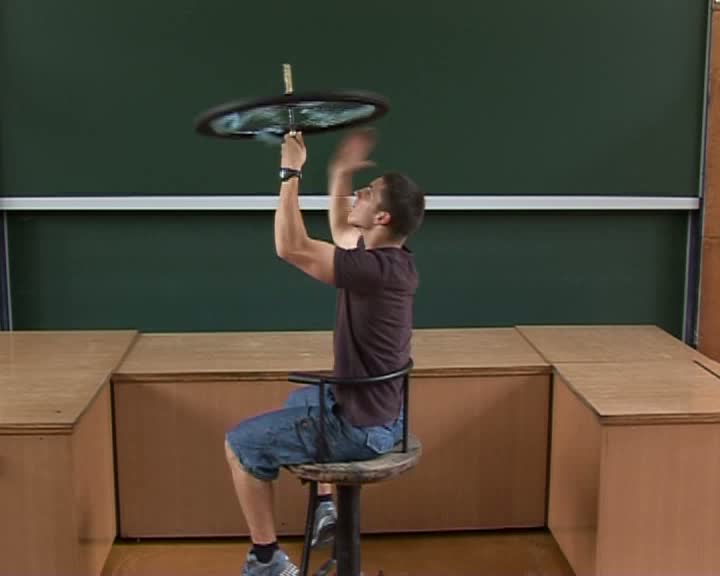„Perdület megmaradás III.” változatai közötti eltérés
| (egy szerkesztő 4 közbeeső változata nincs mutatva) | |||
| 9. sor: | 9. sor: | ||
A biciklikerék tehetetlenségi nyomatékát úgy növeltük meg, hogy a gumi alá acélhuzalt tekercseltünk. | A biciklikerék tehetetlenségi nyomatékát úgy növeltük meg, hogy a gumi alá acélhuzalt tekercseltünk. | ||
| − | == | + | == Conservation of angular momentum III. == |
| + | |||
| + | The experimenter sits on a rotating stool at rest and holds a stationary bicycle wheel. The stool can be rotated if the bicycle wheel will be rotated around a vertical axis. Let us observe that the direction of rotation of the wheel will determine the direction of rotation of the stool, which will be opposite to that of the wheel. | ||
| − | |||
</wikitex> | </wikitex> | ||
A lap jelenlegi, 2013. június 27., 12:25-kori változata
Az elhangzó szöveg
Nyugvó forgózsámolyon ülő kísérletező mozdulatlan biciklikereket tart a kezében. Forgásba hozható a zsámoly oly módon, hogy a biciklikereket függőlegesen tartott tengellyel forgásba hozzuk. Figyeljük meg, hogy a kerék forgásiránya határozza meg a zsámoly forgásirányát, amely éppen ellentétes lesz a biciklikererék forgási irányával.
Kísérleti elrendezés
A biciklikerék tehetetlenségi nyomatékát úgy növeltük meg, hogy a gumi alá acélhuzalt tekercseltünk.
Conservation of angular momentum III.
The experimenter sits on a rotating stool at rest and holds a stationary bicycle wheel. The stool can be rotated if the bicycle wheel will be rotated around a vertical axis. Let us observe that the direction of rotation of the wheel will determine the direction of rotation of the stool, which will be opposite to that of the wheel.
